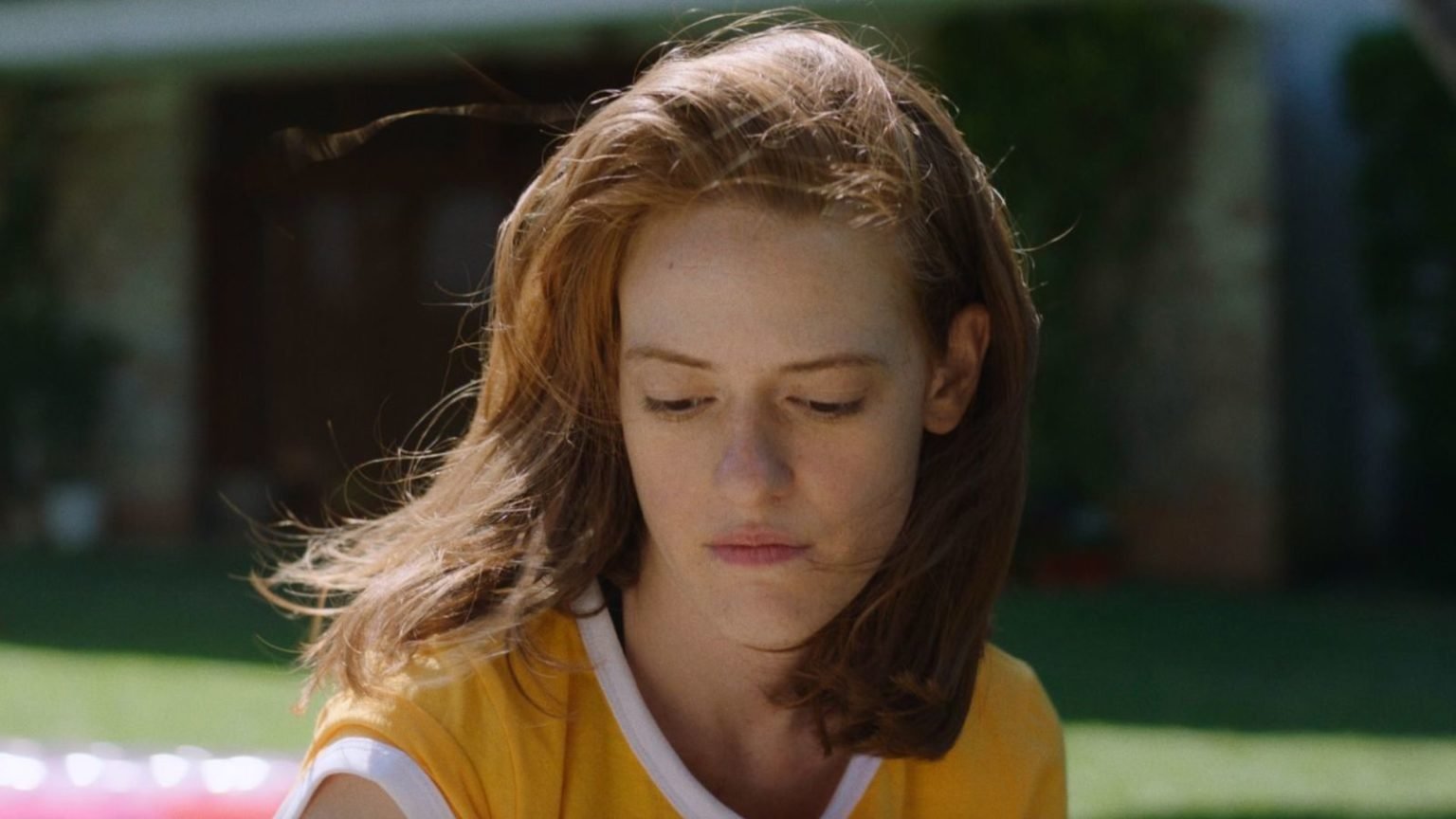Greek director Jacqueline Lentzou speaks about visual storytelling, her relationship with her leading actress, and remaining unconventional with her feature debut, Moon, 66 Questions.
Moon, 66 Questions (Jacqueline Lentzou, 2021)
Attuned to the feelings of alienation, longing and confusion that preoccupy many of us, watching Jacqueline Lentzou’s films feels like viewing the world through a kaleidoscope of raw and unstable emotions. Favouring mood over plot, her work combines the intimacy of a memoir with an empathetic curiosity about human behaviour and the mysteries of the universe. After several critically acclaimed short films, Lentzou’s feature length debut Moon, 66 Questions has finally arrived. A heartfelt tale about the reversal of a parent-child dynamic, the film follows Artemis (Sofia Kokkali) as she returns to Greece to care for her estranged father, Paris (Lazaros Georgakopoulos) after he suffers a sudden and debilitating illness.
On behalf of ALT/KINO, Patrick Gamble sat down with Lentzou to discuss her latest film and how it sits alongside her earlier work.
ALT/KINO: I was wondering if we could start by talking about where the idea for Moon, 66 Questions came from?
Jacqueline Lentzou: The film is based on the experience of people I know. When I heard their story I was fascinated by this idea that the deterioration of someone's health could correlate with the forging of a new relationship. Paris is a guy who never had the chance to be himself because society would never accept him. I wanted to show how his inability to feel deep affection for another person would affect his relationship with his daughter, and create this vicious circle of unspoken love.
A/K: Where do you start when writing a script about two characters who are struggling to communicate with each other?
JL: It was really hard, but I've always been more interested in visuals than dialogue, so I enjoyed the challenge. When we talk about communication I think the problem is we don’t really “see” other people when we talk to them. I worked very hard on the way these characters look at each other and focused a lot on their sightlines. When they’re first reunited in the hospital, Paris can’t bear to look at his daughter but, as the film progresses, they eventually reach a point where they feel comfortable holding each other’s gaze.
A/K: Your films often contain supernatural elements, albeit with an ambiguous air surrounding them. I was wondering if you could talk a little about your choice to use tarot cards for the film’s chapter headings.
JL: My aim was to create an atmosphere that speaks to the hidden secret that eventually unlocks the relationship between Artemis and Paris. These cards exist outside of the story but I hope they allude to there being this extra texture to the film. You never see Artemis use these tarot cards, or visit a horoscopist, but I wanted to create a small universe within the world the characters inhabit. If the viewer wants, they can use this to illustrate this metaphysical connection between the father and daughter. If not, then I'm perfectly happy for them to just be beautiful chapter headings.
Moon, 66 Questions (Jacqueline Lentzou, 2021)
A/K: You’ve previously worked with Sofia Kokkali on Hector Malot: The Last Day of the Year and The End of Suffering (A Proposal), but in Moon, 66 Questions you share the opening credits with her. Could you tell us a little bit about your working relationship?
JL: I decided to share the credits with Sofia because when I was writing the script she was always in my mind; I knew from the very start that she would play Artemis. We’ve worked together three times now, and during that period we’ve become really good friends. Like me, she comes from a very difficult place, and many of our discussions revolve around things like family, anxiety, and existential angst. These conversations somehow found a place in my films. I guess we’re just trying to convert that pain into something creative without being self pitying or too introspective - we’re like, “Hurt Girls United” or something [laughs].
A/K: One of the film’s most impressive scenes sees Artemis let loose to Bomfunk MC's “Freestyler” while washing her car. Movement plays a huge part in the film, so I was wondering how much was choreographed and how much was improvised?
JL: So the car wash scene was done in one take! When we were filming it I was going nuts. I thought we’d created the most amazing scene in cinema history [laughs]. I was sad we couldn’t include it all. That scene was totally improvised but there were others that needed to be meticulously scripted. For example, the scene where we see Paris receiving physiotherapy for the first time; it’s such a sensitive moment that I felt it was important that we made sure it was expertly choreographed. We used a real physiotherapist and when I told him that the actor playing Paris (Lazaros Georgakopoulos) didn’t have multiple sclerosis he refused to believe me. I had to go get Lazaros and make him walk in his normal way to convince him. That was how committed we all were to making his performance feel believable.
Moon, 66 Questions (Jacqueline Lentzou, 2021)
A/K: This is your first feature length film. Was there ever a point when you contemplated taking a less experimental approach when developing the film?
JL: No, not at all. In fact when I was shooting the film I was constantly worried I was being too conservative. I would wake up during the night terrified that I wasn't being brave enough. I was very scared of falling into the trap that a lot of short film directors fall into where they feel like they have to compromise their style to appease a wider audience. But when I watch other films released this year, I can see now that I didn’t make a conventional film. I guess I just really wanted to find a unique way to depict Artemis’ internal suffering so the audience could really understand it. That said, a lot of people have come to me after watching the film and said they had a lot of fun - so maybe something went wrong!
A/K: Your films often feature characters like Artemis who need a little help from the universe to understand the world around them. How much of your approach to filmmaking is driven by a similar hunger for answers to the mysteries of life?
JL: I’m not really in a position to make personal films, because it's so hard to make movies these days, especially in Greece. I know it sounds generic, but I'm fascinated by life as a situation. I knew at the beginning of making this film that it couldn’t just be about a sick father and his daughter. I don’t want to make that film, I'm much more interested in the little things that go unnoticed, that's why I like to push boundaries. Occasionally people will ask me why I use things like the tarot cards, the old VHS tapes, or interplanetary dialogues. They complain to me about these things, saying it takes them out of the film, but I don’t mind this reaction, It means I've experimented. I guess I just want to explore the various ways I can use film to convey stories like this.
Moon, 66 Questions is released in the UK by Modern Films on Friday 24 June 2022. You can find cinema listings on their website.
Patrick Gamble is a writer on film and culture, whose work has featured on Hyperallergic, BFI, Calvert Journal and Kinoscope. Further links to his writing can be found at patrickgamble.contently.com.



